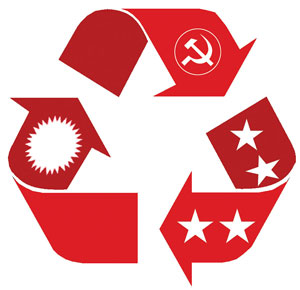 |
From there, the taxes went either to pay for lavish palaces in Kathmandu or investments in Calcutta.
Bhaari Maal administered the very heartland of the Madhes. Its territory stretched from Kamala-Balan in the east to the Bagmati and from the Indian border to the Chure ranges. Jaleshwar is now the headquarters of rump Mahottari. But rumblings here-more than anywhere else in the region-are still indicative of pressure building up in the central Tarai.
Colonial agents built a Raj Devi temple here, as at most outposts of the Gorkha empire. But the presiding deity of the town continued to be Jaleshwarnath, the supreme god of water. It is through him that Shiva displays his powers of being the protector, provider and destroyer of water-dependent farming communities, the backbone of Nepal's economy.
For much of the year, the revered Shiva linga of Jaleshwarnath remains submerged in the inner sanctum, cut out of a single rock within a well, over which a temple has been built. Pilgrims pray at the pool, which remains full but never overflows. Shiva's anger, like his munificence, is displayed through Rato, a temperamental river that flows west of the settlement. The monsoon has barely begun but Rato's wrath has already claimed a life. Even more disconcerting is the political turbulence gathering pace here.
During the Madhes Uprising last year, larger Mahottari remained relatively calm. Unlike the violent eruptions in Lahan to the east or the gore of Gaur in the west, protests in Jaleshwar were restrained. That may not last if nothing changes in the attitude of Kathmandu's rulers towards the Tarai.
As elsewhere in Nepal, joblessness, backwardness and poverty in the Madhes have intensified with the continued neglect of agriculture. But it's the smugness of the rulers-predominantly Pahadis-that really rankles. The conduct of government officials towards the people they are supposed to serve is the primary, but not the only, source of rancour.
Though the masses still accept mistreatment as their lot, the petit bourgeois-the most volatile section of the population-vocally question the status quo these days.
Retired Madhesi officials and teachers feel that they now receive less respect than they extended to Pahadis during their own working careers. Returnees from West Asia and Malaysia feel the anger when they are questioned rudely at Kathmandu airport. Students believe they are destined to fail in a system loaded against them. Job-seekers have no confidence in the hiring mechanisms of the government. Procurement procedures of development agencies are perceived to be inherently biased against Madhesi entrepreneurs.
This then is the constituency of the MJF and the TMLP. However, both these Madhes-based parties are dismissed as perfidious. Perhaps that's the reason they have lately begun to assert themselves in the distant capital. The continued neglect of the Madhes is becoming a rallying point to those advocating armed insurrection. Until a year ago, the view that Madhesis should become like Maobadis to get their due would have been taboo at social gatherings. Today it's a constant refrain.
Even more disturbing is the derisiveness with which the Big Three (NC, UML and Maoists) dismiss the claims of the Other Three Madhes parties (MJF, TMLD and Sadbhabana). The NC seeks advantage from Madhesi-Maoist enmity. The UML bad-mouths Madhesis to consolidate its vote-bank of Pahadi settlers in the Tarai. The Maoists want to show that they are now in charge and are the sole arbiters in deciding what is right or wrong.
The big three parties will have to realise that their fates are intertwined with each other as well as with those of moderate Madhesis. If the MJF and TMLD are made to fail, victory will go the likes of Goit and Jwala Singh, or worse, independent member of the constituent assembly Baban Singh.



